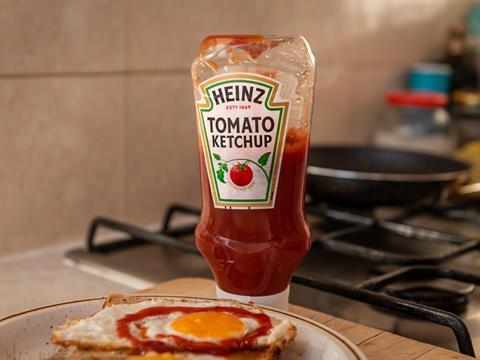
By 2030, The Kraft Heinz Company is aiming to drive down the consumption of virgin plastic in its global packaging portfolio by 20% – estimating a reduction of around 100 million pounds – by minimising components, increasing recycled content, and utilising alternative materials.
In making this change, Kraft Heinz hopes to lower its use of fossil fuels and transition into more sustainable packaging solutions. Its new targets coincide with the company’s existing goals of halving greenhouse gas emissions by 2030 and reaching net zero by 2050, as well as ensuring all its packaging is 100% recyclable, reusable, or compostable by 2025.
Rashida La Lande, executive vice president, global general counsel, and chief Sustainability and Corporate Affairs officer at Kraft Heinz, said: “To achieve our ESG goals, including to reach net-zero GHG emissions, we can’t continue to do things as we have in the past.
“We are investing in innovative technologies and partnerships that are critical to helping us redesign packaging, eliminate unnecessary plastic, increase our use of recycled content, and influence the adoption of reuse models. This is one more way we’re renovating our product portfolio to not only offer more sustainable options, but to deliver on our consumer expectations.”
One of the company’s methods is to replace virgin plastics used in its packaging with recycled content. This includes continuing its work with the US, Canada, and UK Plastics Pacts to increase its recycled content – aspiring to replace 15% of its PET rigid plastic packaging portfolio in the United States with post-consumer recycled content by 2025.
Heinz has already produced its Beans Snap Pots in the UK; these food-safe, recyclable pots contain 39% recycled plastic, made using soft plastics returned to Tesco stores by consumers. Most of its bottles sold in the UK, Europe, and Brazil are also said to contain 30% recycled content.
From 2024, its Kraft Real Mayo and Miracle Whip mayonnaise brands are set to adopt 100% recycled content in their packaging in a bid to eliminate around 14 million pounds of virgin plastic.
Meanwhile, its efforts to reduce or eliminate materials involve the removal of the plastic ‘shaker’ bag from its Shake ’n Bake product line. This is expected to remove 900,000 pounds of plastic waste from the product portfolio every year.
A multipack paperboard sleeve has also been developed by Heinz to replace plastic shrink wrap in the UK – a move thought to have reduced over one million pounds of plastic last year.
Additionally, Kraft Heinz is experimenting with fibre-based materials and other alternative materials for future packaging formats. For example, in a reported first for sauce products on the market, a pilot with Pulpex in 2022 resulted in a paper-based, renewable, and recyclable bottle made from 100% sustainably sourced wood pulp for Heinz Tomato Ketchup. Its prototype is currently being tested for performance before it is brought to market.
Additionally, Canadian coffee brand Nabob seeks to phase out its non-recyclable flexible plastic coffee bags with recyclable canisters made from 80% paper fibre from renewable sources; this is estimated to eliminate an annual volume of 2.5 million plastic bags.
Early last year, PepsiCo announced its own intent to utilise 100% recycled or renewable plastic in all of its crisp packets by 2030.
Since then, it has collaborated with Smurfit Kappa to develop a cardboard alternative to the plastic outer packaging of its Walkers crisps brand; trialled paper-based outer packaging for two flavours of its Walkers Baked six-pack multipacks; and experimented with ‘bagless’ multipack packaging for its Snack A Jacks range.
Kraft Heinz has also been named as a Sustainability Awards 2023 finalist under the commercialised Recyclable Packaging category for Balaton, its mono-material dispensing closure.
If you liked this article, you might also enjoy:
McKinsey on whether or not on-pack sustainability claims affect consumer spending
A deep dive into the most important packaging sustainability trends and solutions














No comments yet